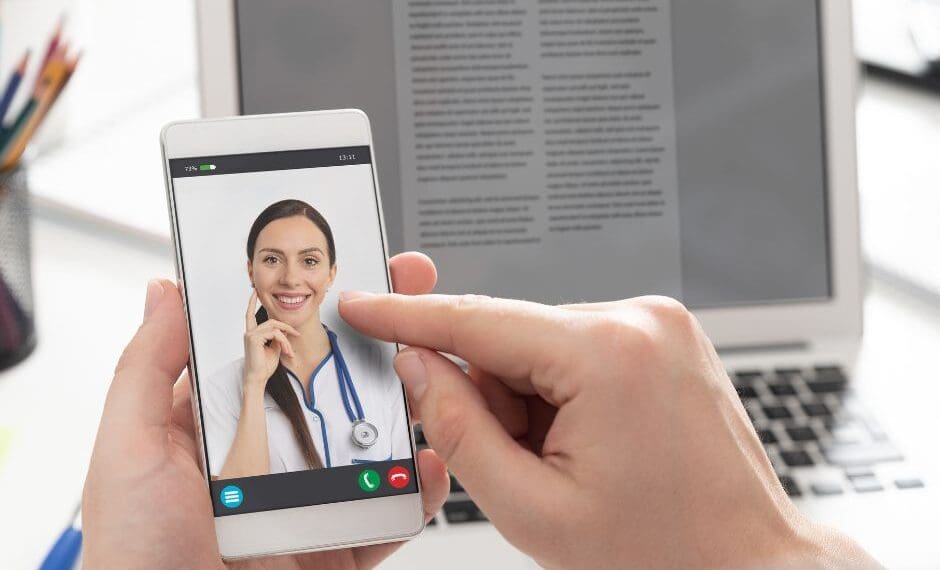Full Disclosure: Clicking on these links could mean a tiny commission for me, at no extra cost to you.
The rise of AI mental health tools marks a huge shift in how people are able to receive mental health support,making care more accessible, personalized, and immediate. Traditional systems often leave people waiting or feeling unseen, but digital tools and AI are starting to fill those gaps. Whether it’s a chatbot that checks in on your mood or a smart app that helps you track patterns of your sleep or anxiety, these technologies are reshaping the way we care for our minds. And when used alongside more grounding tools, like our anxiety fidget rings and simple calming routines, tech doesn’t replace the human side of healing, it strengthens it.

AI is opening new doors in mental health care, offering tools that are faster, more personalized, and more accessible than ever before. From virtual therapists that check in at 2 a.m. to wearable devices that quietly track signs of stress, AI mental health support is changing how we approach emotional well-being. These tools are helping bridge gaps where traditional care has struggled—especially when it comes to reaching people in crisis or in remote areas.
But with innovation comes responsibility. As helpful as AI can be, it also raises tough questions about privacy, bias, and keeping the human connection at the center of healing. In this guide, we’re exploring how artificial intelligence is reshaping the future of mental health, the challenges still ahead, and how it all fits into a more holistic approach—right alongside your favorite crystals for anxiety, self care items, and tools for emotional support.
Artificial Intelligence (AI) and Mental Health Treatment
AI is changing the way mental health support is delivered, bringing more precision, speed, and personalization to the process. By analyzing massive amounts of behavioral and emotional data, AI mental health tools can spot early warning signs, track mood patterns, and even suggest tailored interventions before symptoms escalate. For many struggling with anxiety, depression, or emotional overwhelm, this kind of early insight can be a game-changer.
In a time where traditional systems are overwhelmed and often miss the nuanced, real-world factors that influence mental health, AI steps in with a more holistic lens. And when paired with other supportive practices, like using healing stones, spinning rings, or self care items, these tools help create a more well-rounded, responsive approach to emotional wellness.
AI in Mental Health Diagnosis and Early Detection
One of the most powerful ways AI mental health tools are making a difference is through early detection. By analyzing everything from speech patterns to written text and health records, AI can pick up on subtle signals of emotional distress that might otherwise go unnoticed. It’s being used to help flag potential signs of depression, anxiety, eating disorders, and PTSD—often before a person even reaches out for help.
In some cases, these tools can scan social media posts or therapy transcripts to identify shifts in tone or language that suggest someone is struggling. This opens the door for faster, more proactive support.
AI-Driven Virtual Therapists and Support Tools
Another breakthrough is the rise of AI-driven virtual therapists, which provide mental health therapy through chatbots and mobile apps 24/7. These tools support mental health by guiding users through mindful exercises and cognitive behavioral techniques.
While they don’t replace human therapists, they are invaluable for young adults and those in remote areas:
- Serving as an accessible first line of support
- Helping you track your symptoms
- Supplement mental health care between sessions
- Provide therapy exercises based on cognitive behavioral techniques
The World Health Organization has emphasized the importance of digital tools in expanding mental healthcare globally.
Personalized Coping Strategies Through Artificial Intelligence
Modern AI systems can adapt quickly, offering personalized coping mechanisms based on your unique mental health experiences. Whether you are dealing with anxiety or other mental health disorders, these tools use machine learning to refine their responses based on your input.
This means the support you receive continuously evolves to suit your mental health concerns more effectively.
AI Tools in Improving Access to Mental Health Resources
The biggest challenge in mental health care is accessibility, especially in areas that are geographically isolated. Many people with mental health conditions struggle to find timely help due to cost, stigma, or a lack of providers. Artificial intelligence is bridging this gap in several ways:
AI in Telehealth and Remote Monitoring
Healthcare systems are increasingly integrating AI-enabled platforms to offer mental health care remotely. Wearable devices and mobile apps track cognitive function, sleep patterns, and mood fluctuations, providing real-time insights to mental health professionals.
For instance, AI algorithms can alert providers if a patient’s mental health symptoms worsen, allowing for immediate adjustments in treatment. This is especially valuable for individuals with mood disorders or those at risk of a mental health crisis.
Reducing Administrative Burdens on Providers
Mental health professionals often spend a lot of time on administrative tasks, such as updating electronic health records and scheduling appointments. AI-driven tools automate these processes, freeing clinicians to focus on patient care.
By streamlining workflow, AI technology ensures healthcare providers can dedicate more time to therapy sessions and personalized treatment plans.
Challenges and Ethical AI Considerations
While artificial intelligence offers immense potential, its implementation in mental health systems must be cautiously approached. The sensitive nature of mental health issues requires responsible and effective implementation.
Ensuring Accuracy and Avoiding Bias in Healthcare Systems
AI models rely on training data, which can sometimes reflect biases. If datasets underrepresent specific demographics, AI systems may produce inaccurate diagnoses for marginalized groups.
Regulating AI in mental illness treatment is essential to ensure fairness and reliability.
Maintaining Human Oversight
Despite advances in artificial intelligence, human expertise remains irreplaceable. AI-driven interventions should complement, not replace, traditional therapy. Mental health providers must review AI-generated insights to avoid misdiagnosis and ensure personalized care.
Protecting Patient Privacy
The use of AI in treating mental illnesses involves handling sensitive patient data. Strict data security measures are necessary to prevent breaches and maintain trust. Health systems must prioritize encryption and ethical guidelines when deploying AI tools.
Real-World Applications of AI for Mental Health Disorders
Several rehab centers, like the mental health treatment centers in Massachusetts,are already leveraging AI and healthcare innovations to improve comprehensive mental health programs.
AI for PTSD and Trauma Therapy
Psychological practices are using generative AI to create personalized therapy scenarios for veterans with post-traumatic stress disorder. These simulations help patients process trauma in a controlled environment, enhancing traditional mental health therapy.
Early Diagnosis for Better Mental Health Outcomes
Psychology practices use machine learning models to analyze speech patterns to detect early signs of psychotic episodes.
Studies show that AI algorithms can predict mental health problems like schizophrenia before severe symptoms appear, allowing for early intervention and better patient outcomes.
Chatbots for Emotional Support
Apps like Woebot and Wysa use natural language processing to provide mental health support through conversations. While not a substitute for human care, they offer immediate assistance for mental health concerns, reducing wait times for therapy.
The Future of Artificial Intelligence in Mental Health Care
There is a need to develop AI models further to expand their role in treating mental health issues. Future advancements may include:

- A deeper understanding of mental health issues through cognitive analysis.
- More precise AI tools for diagnosing mental healthcare concerns.
- Enhance early detection through computer vision and voice analysis.
However, success depends on clinical trials and collaborations between mental health providers and policymakers to ensure ethical AI practices.
Conclusion
Integrating AI and digital tools in mental healthcare is not just about innovation; it’s about enhancing your experience, improving access, and offering more effective support. As mental health illnesses continue to rise, artificial intelligence offers a hopeful path forward.
Whether seeking help, offering care, or simply exploring the future of mental healthcare, now is the time to embrace AI’s possibilities.
Additional Resources
At Anxiety Gone, we believe in healing together. We’ve partnered with trusted wellness organizations to bring you the most effective tools, insights, and support. Some links may earn us a commission — always at no extra cost to you.
Join The Club
Connect with our private self-care community for daily support, exclusive tips, and inspiration. Join us today
Talk Therapy
Get matched with licensed therapists online through BetterHelp and begin your healing today. Start now
Hims/Hers
Receive personalized, affordable mental health care + medication from home — no insurance required. Learn more
Mental Health, Right to your Inbox
Subscribe to our newsletter for a place to rest your mental health and find ways to support your journey. Sign up
Emotional Freedom Technique
Tap your way to calm with scientifically backed stress relief. Our readers receive a 14-day free trial! Try EFT now
Mindfulness App
Access 2,000+ guided practices to support your mental health wherever you are + exclusive discount when you upgrade Try it
Online Breathwork
Experience calm and reset your nervous system with guided sessions and receive your first month free . Get started
Find a Helpline
If you need immediate support, visit our directory to find help near you. See helplines









Discussion about this post